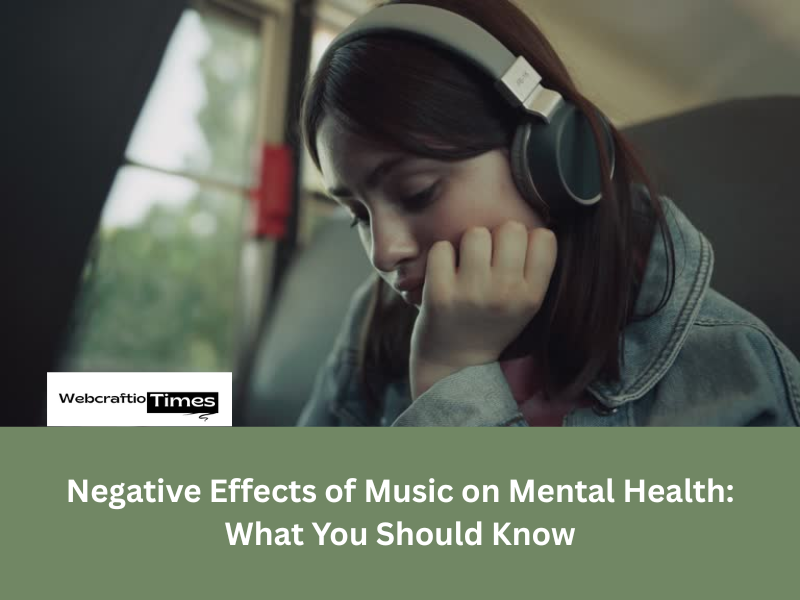Music affects the mind. People recognize its power to uplift and soothe. However, the influence of music is complex. You must understand how music can negatively impact your psychological well-being. Focusing only on positive aspects ignores significant mental health risks. We explore the concerning effects of music on mental health.
Increasing Depression and Negative Feelings
Music acts as an emotional mirror. When you feel sad, you often seek out melancholy songs. Researchers call this phenomenon “mood-congruent listening.” This habit can, unfortunately, make negative feelings stronger.
The Danger of Negative Thoughts
Rumination involves repetitive, distressing thoughts. Sad music often reinforces these unhealthy thought patterns. You may use music to wallow instead of process emotions constructively. Studies show this listening style is linked to higher levels of anxiety and neuroticism. People with pre-existing depression are especially susceptible to this effect. They use music to extend their focus on negative experiences. This behavior can deepen the severity of their depressive symptoms.

Unhealthy Coping Styles
Music becomes harmful when you rely on it for an unhealthy coping mechanism. You should use music for reflection, not to amplify your distress. Music should help you move forward. It should not encourage you to stay stuck in a negative thought loop. You need to identify if your sad playlist is helping or hurting you.
You May Read This: Side Effects of Energy Drinks On Mental Health: What You Really Need to Know
Reduced Focus and Mental Distraction
Many people listen to music while working or studying. They believe it boosts their concentration. However, music often interferes with complex cognitive tasks.
The Problem with Lyrics
Music containing lyrics presents a major distraction. Your brain competes for attention between the song’s words and the task’s verbal content. This creates an excessive cognitive load. Tasks requiring verbal processing, like writing or reading, suffer the most. Performance is generally better in silence for demanding work.

Distraction and Task Complexity
Listening to music, even without lyrics, can be distracting. This effect is especially true when the music is fast-paced or aggressive. Researchers find that preferred music can still distract during demanding tasks. Your brain allocates cognitive resources to processing the music. This leaves fewer resources available for the actual work. Complex work requires silence for optimal performance.
The Triggering of Traumatic Memories
Music’s powerful link to memory is a double-edged sword. Music easily accesses the emotional centers of the brain. This can pose a significant risk for individuals with trauma.
Music-Evoked Trauma
A song can become powerfully linked to a past traumatic event. Hearing that specific piece of music can instantly trigger a traumatic memory. This reaction causes severe distress. The strong emotional response bypasses normal cognitive control. This phenomenon is distinct from simple sadness or nostalgia. For trauma survivors, certain music acts as a painful, involuntary cue.
Emotional Hijacking
Music can “hijack” your attention. A song connected to a painful memory can suddenly flood your mind. You lose your focus on the present moment. This emotional flooding can make daily regulation extremely difficult. People must exercise caution with music linked to emotional pain.
Social Isolation and Withdrawal
Music often fosters social connection. It also carries the potential for increased social isolation. You may use music as a social substitute.

Using Music as a Surrogate
People sometimes use music to feel less lonely. They substitute the music for actual human interaction. Favorite music acts as a “social surrogate,” temporarily buffering loneliness. However, over-reliance on this substitute can prevent you from seeking real social support. You might choose private listening over engaging with friends.
Barriers to Real Connection
Excessive solo listening can become a pattern of social withdrawal. You create an emotional bubble that keeps others out. Music-making in a group promotes social bonding. Conversely, passive, isolated listening can reinforce isolation. You risk deepening feelings of loneliness over time.
Risk of Auditory Damage and Related Stress
The volume at which you listen to music presents a physical risk. This physical damage has a ripple effect on mental health.
Hearing Loss and Anxiety
Long-term exposure to loud music, especially through headphones, damages hearing. Hearing loss contributes to anxiety and social difficulties. People with hearing issues often struggle in group settings. This struggle can lead to stress, fatigue, and social withdrawal.
Tinnitus and Mental Load
Hearing damage can cause tinnitus, a persistent ringing in the ears. Tinnitus significantly increases mental load and stress. You constantly fight to ignore the intrusive noise. This constant effort drains cognitive energy. It severely impacts your concentration and overall mood.
Read More: Seasonal Affective Disorder: Tips for Dealing with Seasonal Depression
The Conscious Choice
Music remains a valuable therapeutic tool. However, you must approach it with awareness. You have the choice to use music for positive growth. Alternatively, you can allow it to reinforce negative thought patterns. The Effects of Music on Mental Health depend on your listening style. Monitor your playlists. Choose music that metabolizes distress. Do not select songs that encourage destructive rumination. Be an active listener, not a passive victim. Your mental well-being requires your conscious attention.
Negative Effects of Music on Mental Health: FAQs
1. Can sad music make depression worse?
Yes. If you frequently use sad music to ruminate (dwell on negative feelings), it can reinforce unhealthy thought patterns. This can worsen or prolong symptoms of depression and anxiety.
2. Does music hurt your concentration while working?
Yes, often. Music with lyrics is especially distracting during tasks requiring verbal or deep focus, like writing or reading. Your brain struggles to process both the words in the song and the task simultaneously.
3. How can music negatively affect people with trauma?
Music is powerfully linked to memory. A song associated with a past event can act as a sudden cue or trigger, causing the person to involuntarily relive or be distressed by a traumatic memory.
4. Can listening to too much music lead to social isolation?
It can. Over-relying on music as a “social surrogate” using it to feel less lonely, may unintentionally substitute for and discourage real-life social interaction and connection, reinforcing withdrawal.
5. Does the volume of music impact mental health?
Yes. Listening to music too loudly, especially with headphones, risks hearing damage (like tinnitus). This physical issue then increases stress, causes mental fatigue, and hurts concentration.



